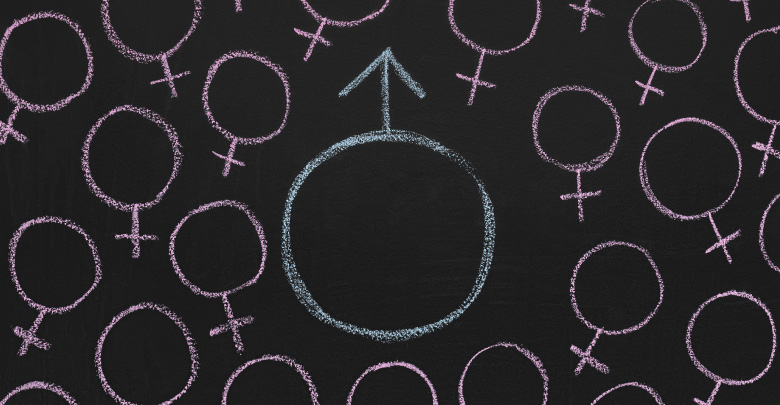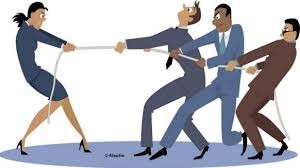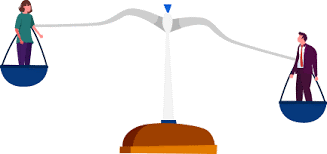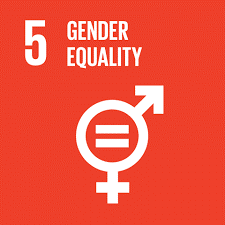
According to the UN:
- In 18 countries, husbands can legally prevent their wives from working; in 39 countries, daughters and sons do not have equal inheritance rights; and 49 countries lack laws protecting women from domestic violence.
- In 46 countries, women now hold more than 30 percent of seats in the national parliament in at least one chamber.
- Only 52 percent of women married or in a union freely make their own decisions about sexual relations, contraceptive use, and health care.
Gender equality is not only a fundamental human right but a necessary foundation for a peaceful, prosperous and sustainable world.
- Difference between gender-based discrimination and sexism
Introduction
You can start by asking participants to say 1 word of what associates them to Men or Women.
Also, you can google MEN and then WOMEN.
What is typical for men/women in the pictures? How are they perceived by the general population?
What is sexism?
Sexism is prejudice or discrimination based on sex, especially in the form of discrimination against women ( Merriam-Webster). Sexism is based on the idea that women are inferior to men, and functions to oppress women in society.
Is it similar to gender discrimination?
Gender discrimination is theoretically different from sexism. Whereas sexism is prejudice based on biological sex, gender discrimination specifically adresses discrimination towards gender identities, including third gender, genderqueer, and other non-binary identified people.
Activity N1.

Start a general discussion about sexism, discrimination and stereotyping. Participants share their opinion. Why is this happening? If there are participants from different countries, compare and see whether there is a difference?
https://www.youtube.com/watch?v=Ulh0DnFUGsk (optional video explaining gender stereotypes)
- Most popular forms of sexism
Whereas legal and political equality is clearly defined and measurable, social equality is murky and complicated. The current feminist movement is not a protest against unjust laws or sexist institutions as much as it is the protest against people’s unconscious biases as well as centuries-worth of cultural norms and heritage that disadvantage women. Women still get screwed over in myriad ways. It’s just that whereas before it was an open and accepted part of society, today much of it is non-obvious and even unconscious.
Activity N2.

Ask participants to describe what is the most typical way of treating women in society. At work, home and with friends. Then watch the video and list the reasons women are treated differently. Discuss the differences between questions asked to men and women.
https://www.youtube.com/watch?v=vrSTsWNqRzw
- What about men?
Ask about the role of men in sexism? Listen to their opinions, then play the video. It is a UN campaign for raising awareness among men for not discriminating against women and enhancing gender equality. The website contains videos of different initiatives in countries to promote gender balance. www.heforshe.org
https://www.youtube.com/watch?v=7ZptgM-jhZo (video He for She)
- Conclusion – no one wins in an unequal world
https://www.youtube.com/watch?v=2B3ea7IGwLA (optional – video of children from different corners of the world, explaining what it means to be a girl/boy or woman/man)
Activity N.3

The last activity is about imagining the world without gender stereotypes. What would happen when men and women are freed from expectations and assumptions.
In the end, gender stereotypes are a straightjacket for both sexes. A society where gender was less of an issue would free up both men and women.
Men, in particular, would be released from constricting gender stereotypes about being the family breadwinner, giving them more flexibility when it comes to career choices, work/life balance, caring for children and healthily expressing their emotions. Freed from a rigid stereotype of masculinity, they would live better lives.
Activity N.1.
- What does it mean to be a woman/man in your country?
- Are there any traditions than incite gender discrimination?
Activity N.2
Watch the video, and place accordingly the society’s expectations of women/men
| WOMEN | MEN |
| (Rihanna) Women chase men |
Activity N.3
What would the world look like without sexism?
________________________________________________________________________________________________________________________________________________________________________________________________________________________________________________________________________________________________________________________
Why did I choose this tool?
Although we live in the 21st century and society has far progressed, there are still everyday situations where women are discriminated. Even some educated people still have a tendency to ask women – girly questions, and men – manly questions (video with celebrities). We should work on self-awareness and stop using phrases “…. like a girl” , or “boys will be boys”…etc. It’s our daily life that shapes our culture and the culture of our society.
Reflection questions
How do we get to have these images of men/women?
When did men and women begin to be treated differently?
Exercises:
Divide into small groups, read one of these stories and discuss
Geri’s story: An underemployed and underpaid caregiver
I am 52-year-old, and I work 30 hours a week at a large retail store have a 10-year-old daughter. A year ago, my mother fell and sustained an injury that prevented her from caring for herself, so I cut my hours to part-time to help her. When I worked full-time, I was paid an hourly wage that covered our family expenses. I earned less than my male coworkers, but I did get health insurance for myself and my daughter. I lost our health insurance when I changed to part- time work. My brother helps our mother too. But he doesn’t think cooking and cleaning area man’s work. So, I spend more time caring for my mom than my brother does. I devote about 15 hours a week to helping my mom. If I could get compensate – even a little– for assisting my mother, it would help me feel like I wasn’t so on the edge financially. And I could put some money away for my daughter’s education.
Reflect on Geri’s story:
What assumptions about men, women and work do you hear in Geri’s story? What is your reaction to her brother’s belief that some duties are “women’s work,” and that women are better caregivers than men? How might your faith lead you to be a neighbor and act for justice for Geri?
How important it is for us to recognize and celebrate our heroes and she-roes!
― Maya AngelouBoth men and women should feel free to be sensitive. Both men and women should feel free to be strong…it is time that we all perceive gender on a spectrum, not as two opposing sets of ideas.― Emma Watson





